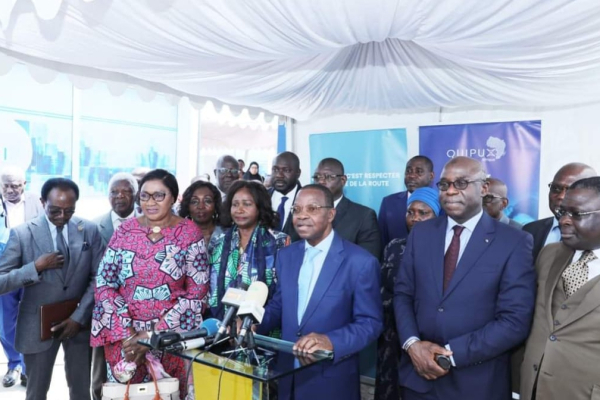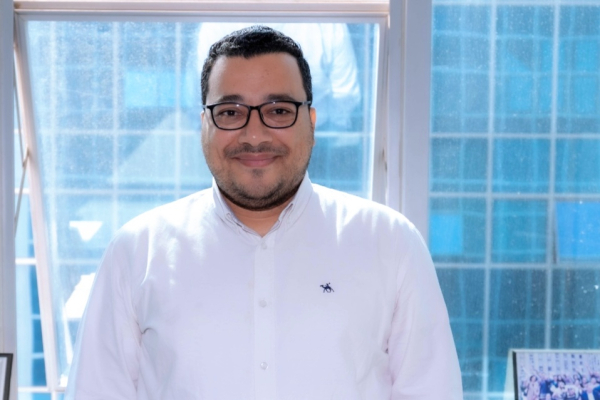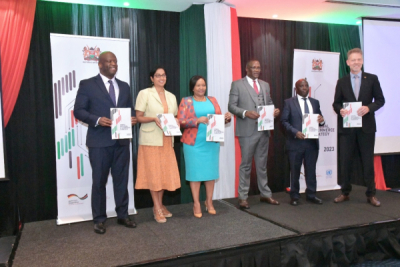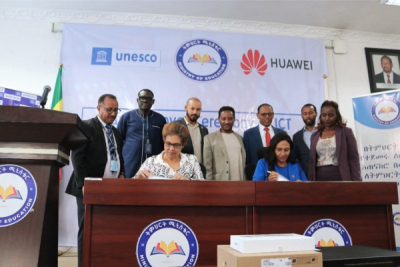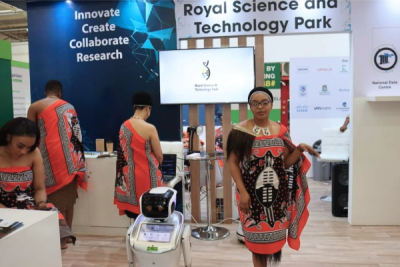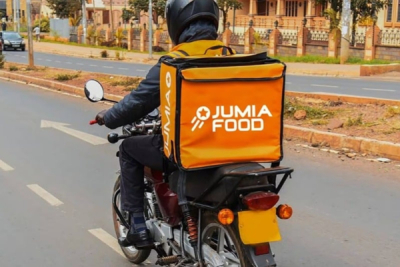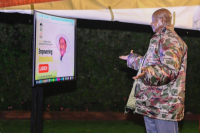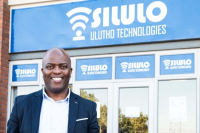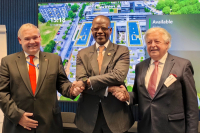The Ivorian government's 2021-2025 development plan unveils ambitious projects for economic and social growth. The projects require substantial financial resources. In that context, authorities are determined to clamp down on loopholes and collect every penny due.
Starting from January 2024, fines for road traffic offenses in Côte d'Ivoire will be processed through the Treasury platform, TrésorPay-TrésorMoney. Ibrahima Koné, the Managing Director of Quipux Afrique, the company overseeing the project, announced this development on Tuesday, December 12, during a visit by members of the Economic, Social, Environmental, and Cultural Council (CESEC) to the Integrated Management Center (CGI) in Treichville.
The platform, implemented by the Treasury and Public Accounting Department, is designed to enhance government revenue collection, ensure operational traceability, and provide immediate access to public funds to meet external support requirements.
This initiative is a key component of the Ivorian government's broader efforts to modernize public services and enhance services for the population. In practical terms, it involves the digitization of all funds collected by the Treasury and its branches, encompassing various fees such as school fees, school examination fees, communal taxes, fixed fines, contraventions, hospitalization fees, royalties, acts of justice, and other payments processed through Treasury departments.
Recent figures released by the National Treasury indicate that from January 2021 to June 10, 2023, over XOF30 billion ($50.2 million) was collected through the TrésorPay-TrésorMoney platform.
Samira NJOYA
A biomedical engineering doctor, he dedicates his efforts to enhancing radiology services. Through his work with Intixel, an artificial intelligence-based platform, he empowers radiologists to minimize diagnostic errors, enhance productivity, and mitigate the risk of disease progression.
Egyptian-born Mustafa Elattar (photo) is a biomedical engineering, image analysis, medical imaging, and artificial intelligence expert. He is also the founder and CEO of Intixel, a company specializing in cutting-edge artificial intelligence solutions for medical imaging.
He holds a master's degree in communication and information technology from Nile University, earned in 2010, and a PhD in biomedical engineering and physics from the University of Amsterdam, completed in 2016.
Established in 2018, his company, Intixel, empowers medical imaging companies to leverage artificial intelligence for product enhancement. Functioning as a supplementary diagnostic tool, Intixel aids radiologists in swiftly identifying anomalies, thereby reducing diagnostic errors. Intixel also assists radiologists in prioritizing high-risk patients, ultimately enhancing their overall productivity. By optimizing workflow efficiency, the platform enables professionals to examine more patients each day, thereby mitigating the risk of disease progression exacerbated by prolonged waiting lists.
Since 2017, Mustafa Elattar has served as an assistant professor at Nile University. His earlier career includes roles as a research assistant and PhD student at the Academic Medical Center from 2012 to 2016, followed by a postdoctoral fellowship at the Netherlands Cancer Institute in 2016. From 2017 to 2018, he served as the Head of Research at Myocardial Solutions Inc., a medical technology company dedicated to transforming cardiac and cancer care.
He is also a prolific author with over 68 journal articles and conference publications, disseminating his research ideas and innovations. In 2019, he won the pitch deck and best health-tech startup award at the Takeoff Istanbul International Startup Summit. He also received the Fareed Bader Award at the World Entrepreneurs and Investment Forum (WEIF). In addition, his company was in the top 5 start-ups at the Young Business Hub Entrepreneurship Investment Summit in Bahrain. In 2022, he received the IVLP Impact Award from the US State Department for an artificial intelligence hackathon project he launched on behalf of Nile University.
Melchior Koba
The development of information and communication technologies fueled the growth of ecommerce across Africa, encouraging the multiplication of startups in the sector. In that context, to unlock the full potential of this economic engine, creating a robust legal framework becomes a critical and urgent need, ensuring both consumer protection and investor confidence.
On Wednesday, November 13, in Nairobi, Kenyan authorities, in collaboration with the German Agency for International Development Cooperation (GIZ) and the United Nations Conference on Trade and Development (UNCTAD), unveiled the country’s national e-commerce strategy. The primary goal is to enhance both domestic and cross-border trade, enabling local producers to respond to the international market.
"In the contemporary digital landscape, digital trade emerges as a gateway to commerce with a significantly low entry barrier. Notably, Kenya takes the lead among African nations, with its digital economy contributing a substantial 7.7% to the GDP. The newly launched Kenya National E-commerce Strategy aligns with our commitment to empowering local businesses and fostering economic growth from the ground up," explained Rebecca Miano, Kenya's Minister of Investment, Trade and Industry.
The launch is part of the government's strategy to make the country a leading technology hub on the continent and in the East African sub-region in particular. Startups operating in the e-commerce sector, such as Wasoko and Copia Global, have been able to emerge in the Kenyan ecosystem and will be able to continue their growth with the safeguards put in place by the public authorities to stimulate the sector's development.
Developing e-commerce-specific financing products; raising awareness of the need for documentation and collateral for financing; improving links between companies and financial institutions; and developing investment incentives are some of the objectives set by the country's authorities when rolling out the strategy.
Adoni Conrad Quenum
The COVID-19 pandemic has irrevocably changed the education landscape. With classrooms shut down and social distancing becoming the norm, the transition to digital education became a matter of survival for schools around the world. However, this shift is not merely a temporary response to a crisis; it presents a vital opportunity to reshape education for the future.
The Liaison Office of the United Nations Educational, Scientific and Cultural Organization (UNESCO) in Addis Ababa, in partnership with Huawei, has provided Ethiopian schools with a vital technology boost. On Thursday, December 14, representatives from both organizations handed over IT equipment to the Ethiopian Ministry of Education and regional education offices.
The delivery includes 480 tablets, 48 laptops, 48 access points, and 24 smartboards. This equipment is part of the TeOSS Project (Schools Open to All through Technology), a joint initiative aimed at bridging the gap between school and home learning and ensuring quality education for all.
"Beyond the classroom, the TeOSS project is a catalyst for innovation and economic growth," said Rita Bissoonauth, Director of UNESCO's Liaison Office in Addis Ababa. "By equipping schools with ICT facilities, we are empowering students to shape Ethiopia's future. Congratulations to UNESCO and Huawei for leading the charge," she added.
The $300,000 investment will equip 24 secondary schools across Ethiopia, providing students and teachers with essential tools to enhance their learning experiences. The TeOSS project, supported by the Huawei Trust Fund, aims to build technology-based, crisis-resilient school systems. This includes facilitating continuity and quality of learning in both normal and crisis situations, a crucial factor in Ethiopia's educational landscape.
Aligned with UNESCO's Priority Africa strategy, the TeOSS project extends its reach beyond Ethiopia. Sub-Saharan African countries like Ghana and Egypt are also participating in the initiative, with the shared goal of utilizing technology as a driving force for quality education and digital development opportunities.
In Ethiopia, the TeOSS project is focusing on building robust ICT infrastructure in pilot schools. This includes connecting schools, setting up a learning management system, and integrating a dedicated teacher training platform.
Samira Njoya
Driven by a bold vision to transform eSwatini into a tech titan, King Mswati III spearheaded the creation of the Royal Science & Technology Park, a hub fostering scientific advancement and innovation.
The Royal Science & Technology Park (RSTP) is a science and technology hub established in 2007 in the Kingdom of eSwatini. Its inception, fueled by the forward-thinking vision of King Mswati III, was formalized through the enactment of the Royal Science & Technology Park Act in 2012. Spearheading this innovative initiative is Vumile Dlamini.
RSTP's main mission is to champion science, technology, and innovation within Eswatini, fostering an environment that cultivates research, development, and entrepreneurial endeavors. Spanning an expansive 317.17 hectares, the park comprises two distinct sites: the Nokwane Site and the Phocweni Site.
Dedicated to information technology services and products, the Phocweni Site boasts a specialized training center known as the Advanced School of IT. Affiliated with Aptech, a global leader in training solutions, this center caters to both retail and corporate sectors. Furthermore, the site hosts a business incubator designed to stimulate innovation in pivotal sectors such as information and communication technologies, biotechnology, agriculture and food, climate and the environment, waste management (green solutions), and indigenous knowledge systems.
Notably, the Phocweni Site is equipped with essential infrastructure, including a national contact center and a national data center. The latter plays a crucial role in delivering secure, efficient, and reliable ICT services to businesses while actively contributing to the advancement of e-government and championing digital inclusion throughout the Kingdom of eSwatini.
The second site, Nokwane, houses a research unit that serves as a multi-purpose platform for research and development in biotechnology-related technologies, production, product marketing, and trade.
Under the Kingdom's Special Economic Zones (SEZ) Act 2018, the Royal Science & Technology Park has been designated a Special Economic Zone.
Melchior Koba
In addition to its core e-commerce business, Jumia also launched a food delivery service. This service did not live up to the expectations of the startup's management.
E-commerce giant Jumia will shutdown Jumia Food by the end of this month. The decision, communicated through a press release on Wednesday, December 13th, cites the current challenging economic conditions and macroeconomic environment in its African markets as the primary factor.
Jumia Food, operating in seven markets across Nigeria, Kenya, Uganda, Morocco, Tunisia, Algeria, and Côte d'Ivoire, struggled to find profitability in the competitive food delivery landscape. "Food delivery remains a business with very challenging economics, in Africa and across the world, and we want to focus our efforts on our physical goods e-commerce business, in the eleven markets where we operate. This is a matter of prioritization of opportunities, and expected return on investment," explained Antoine Maillet-Mezeray, Jumia’s executive vice-president (EVP) of finance and operations.
Prioritizing profitability, Jumia is streamlining its operations, focusing its capital and resources on its core e-commerce business across its eleven African markets. The company, founded in 2012 and Africa's first unicorn by 2016, has raised $1.2 billion to fuel its growth and remains publicly traded on the New York Stock Exchange.
"The more we focus on our physical goods business, the more we realize that there is huge potential for Jumia to grow, with a path to profitability. We must take the right decision and fully focus our management, our teams, and our capital resources to go after this opportunity. In the current context, it means leaving a business line, which we believe does not offer the same upside potential - food delivery," says CEO Francis Dufay
Adoni Conrad Quenum
Corruption has long been a cancer on Uganda's socio-economic development, stifling progress in various sectors. To combat this issue, the government has turned to technological solutions.
On December 13, Ugandan President Yoweri Museveni officially inaugurated the Electronic Investor Protection Portal (EIPP) at his residence in Entebbe. This new portal is designed to safeguard the interests of investors and combat fraudulent activities by establishing a direct channel of communication with the President's office.
Commending the initiative, President Museveni indicated the EIPP would play a key role in combatting corruption and misinformation. “I [...] congratulate Col. Edith Nakalema and her team for successfully leveraging technology and launching the Electronic Investor Protection portal, which serves as a crucial tool in safeguarding the interests of investors. I wish them good luck,” he wrote on X, formerly Twitter.
Managed by the State House Investor Protection Unit (SHIPU), the platform provides a range of services. These include offering advice to investors through direct access to verified government sources, a comprehensive reporting mechanism for investor inquiries and complaints, rigorous enforcement and follow-up procedures for reported issues, a conduit linking investors to pertinent ministries, departments, and agencies, and language features catering to the diverse linguistic needs of investors.
The introduction of this portal aligns with President Museveni's commitment to fostering a conducive environment for investors, shielding them from unwarranted corruption and bureaucratic hurdles. It comes at a time when corruption is on the rise in the country. According to Transparency International's Corruption Perceptions Index 2022, Uganda ranks 142nd out of 180 countries in terms of corruption control.
Samira Njoya
Ghana will launch a mobile-accessible version of its national ID card next year, announced Moses K. Baiden, CEO of Margins ID Group, the company spearheading the project. The app-based digital card will be equipped with a secure barcode and QR code for seamless verification across various services, including financial transactions.
For more than 19 years, he has dedicated his efforts through Silulo Ulutho Technologies to narrow the digital divide and enhance the quality of life for his fellow citizens. His impactful work has earned him numerous national and international awards.
Luvuyo Rani (photo) is a South African entrepreneur and the CEO of Silulo Ulutho Technologies, a company that sets up community businesses and career centers in South Africa's slums and rural communities, creating employment opportunities for thousands of unemployed young people.
He completed his studies at the Cape Peninsula University of Technology, obtaining a Bachelor of Commerce and Education in 2002, followed by a Bachelor of Business Administration in 2004. He furthered his education by earning an Associate's Degree in Management from the University of Cape Town's Graduate School of Business in 2007. In 2018, he enhanced his leadership skills by completing the Certificate in Leadership for System Change from Harvard Business School Executive Education.
The entrepreneur founded Silulo Ulutho Technologies in 2004 with his brother Lonwabo Rani. The company provides slum and rural populations with accessible infrastructure, a support network, skills development services, and digital connectivity through its community-centric career and business centers.
Since 2021, Luvuyo Rani has been a board member of the Entrepreneurs' Organization, a high-quality support network of over 18,000 business founders and owners. Before founding Silulo Ulutho Technologies, he taught accounting and business economics at KwaMfundo Secondary School from 2001 to 2004.
His entrepreneurial endeavors and significant social impact have earned him numerous accolades. Notable awards include the 2007 Cape Times/KPMG Entrepreneur of the Year, the 2008 SAB Kick-Start Award as second runner-up in the Western Cape, the 2011 Endeavour Global Entrepreneur recognition, and the 2014 acknowledgment as one of the "Ten Outstanding People of the Year" by Junior Chamber International. In 2015, he was honored with a diploma from Tsiba Education, and in 2016, he received the prestigious title of Social Entrepreneur of the Year from the Schwab Foundation.
Melchior Koba
The Smart Africa alliance, a policy initiative for the promotion of digital in Africa, announced on Wednesday, December 13 the signing of a three-year memorandum of understanding with the EoT Foundation.
The agreement, signed on the sidelines of the Digital Sovereignty Forum in Lausanne, Switzerland, aims to support African decision-makers on their digital transformation journey through capacity-building, forums, training, events, and networking between Africa and Europe.
More...
The fintech solution aims to provide an alternative to traditional credit options for individuals with limited or no access to credit, simplifying the purchase process for them
Payflex is a fintech solution launched by a South African eponymous startup providing users with access to financial services, particularly deferred payment options. Established in 2017 by Paul Behrmann and headquartered in Johannesburg, the startup has successfully secured $500,000 in funding since its inception to support its ongoing expansion.
The Payflex solution, available for iOS, Android, and Huawei devices, allows users to create an account –using their details– to unlock the various financial services offered by the fintech. Notably, the flagship product of Payflex is the deferred payment feature, allowing customers to make payments in four installments, with an initial 25% upfront and subsequent 25% installments every two weeks. Upon the payment of the first installment, users gain access to and can enjoy their purchased items. According to the fintech, this innovative payment structure acts as a marketing advantage, boosting sales in partner boutiques by 30%.
Payflex establishes spending limits for its users, with the possibility of increasing the limit for those who consistently demonstrate timely payments. The fintech does not impose additional interest charges on its services. Interest comes into play only when a payment due date is missed, coupled with an automatic adjustment to lower the spending limit, ensuring responsible financial practices.
Despite challenges associated with the limited development of credit services on the continent, primarily due to financial exclusion, Payflex's services are gaining popularity among the South African population. In November 2021, the fintech startup was acquired by an Australian firm, indicating a strategic move to expand operations on the African continent. This acquisition has kept the startup's progress, as evidenced by the Android version of the mobile app surpassing 100,000 downloads, according to Play Store data.
Adoni Conrad Quenum
For over 15 years, I&F Entrepreneuriat has been helping entrepreneurs with innovative business ideas through the business creation process. Through its programs and activities, it has supported over 1,000 entrepreneurs.
I&F Entrepreneuriat, established in 2007 with collaborative guidance from the Institut de la Francophonie pour l'Entrepreneuriat (Mauritius), the University of Bordeaux (France), and Incubateur régional d'Aquitaine (France), is a dedicated organization supporting entrepreneurs in the Democratic Republic of Congo.
Currently led by Val Masamba, an entrepreneur with decades of experience, the organization's core activities encompass training, incubation, mentoring, and financing of innovative projects designed to have a substantial social impact. Boasting over 15 years of experience, I&F Entrepreneuriat has successfully incubated 1,456 companies, including 803 initiated by individuals under the age of 35, with 39% being young women. These companies operate across diverse sectors such as agribusiness, high technology, building materials production, and information and communication technologies.
"I&F Entrepreneuriat is dedicated to the transfer of technology and aims to foster the promotion and development of a systematic approach to detecting, evaluating, economically validating, and supporting both innovative business startups and existing companies—whether or not they are linked to scientific research. This mission is carried out within the framework of a collaborative incubation and incubator structure," the organization explains on its website.
Its incubation program spans 12 to 18 months, adapting to the unique progress of each project. It opens its doors to aspiring entrepreneurs, providing them with physical and legal accommodation, comprehensive support, coaching and mentoring, entrepreneurial and managerial training, and ongoing refinement courses. I&F Entrepreneuriat aids entrepreneurs in constructing their business models and plans, integrates them into business networks and offers post-creation follow-up.
In the post-creation phase, I&F Entrepreneuriat extends its support through a comprehensive incubator. This phase assists new entrepreneurs in setting up and launching their businesses, conducting initial recruitment, establishing relationships with customers and suppliers, managing accounting, negotiating with market players, overseeing bank accounts, participating in trade fairs and conferences for product promotion, and implementing effective marketing strategies.
Finally, I&F Entrepreneuriat's incubation journey culminates in an industrial district designed specifically for small and medium-sized businesses (SMBs). This environment serves as a springboard for incubated entrepreneurs, providing them with the resources and infrastructure needed to thrive. From shared workspace and production facilities to mentorship programs and networking opportunities, the district fosters collaboration and growth, ultimately leading to high-impact, sustainable businesses that empower DR Congo.
Melchior Koba
Following a successful partnership with a South African education technology startup last November, Tanzanian authorities are doubling down on their commitment to educational innovation by collaborating with a Ugandan firm.
On Tuesday, December 12, Ugandan technology firm HiPipo announced a partnership with the Tanzanian Information and Communication Technology Commission (TCIC) to accelerate financial and digital inclusion in the country. This collaboration will be powered by HiPipo's renowned "Include Everyone" program, aimed at fostering fintech innovation, empowering women in the sector, and attracting investments in the ICT industry.
"We are ecstatic to officially announce that a pivotal agreement has been signed and sealed between HiPipo and ICTC. This promising collaboration is aimed at expediting financial inclusion in Tanzania, under the renowned HiPipo Include Everyone Program, with the generous backing of the Bill & Melinda Gates Foundation," reads a post on the LinkedIn page of HiPipo’s CEO, Innocent Kawooya (photo, left).
“The Include Everyone program activities operated globally by HiPipo will play a crucial role in promoting financial inclusion, driving economic growth, fostering ICT investment, advising stakeholders, and building a resilient, knowledgeable group of Digital Innovation and ICT Professionals in Tanzania,” the post continues.
While lagging behind some regional counterparts like Kenya and Rwanda in digital advancement, Tanzania has recently embarked on a journey to bridge the gap. It has multiplied partnerships with various countries, organizations, and startups to accelerate its digital transformation. Earlier this month, authorities announced the upcoming launch, in 2024, of a national framework for the digital economy. In the education sector, the country has also teamed up with South African startup Snapplify to improve the availability and quality of educational resources for students in Tanzania over the next three years.
Adoni Conrad Quenum
Following a phone call on Tuesday, December 12, between Benin's Minister of Foreign Affairs, Olushegun Adjadi Bakari, and his Moroccan peer Nasser Bourita, Morocco has announced that Benin is now eligible for its e-visa program. The decision will become effective on January 1, 2024


